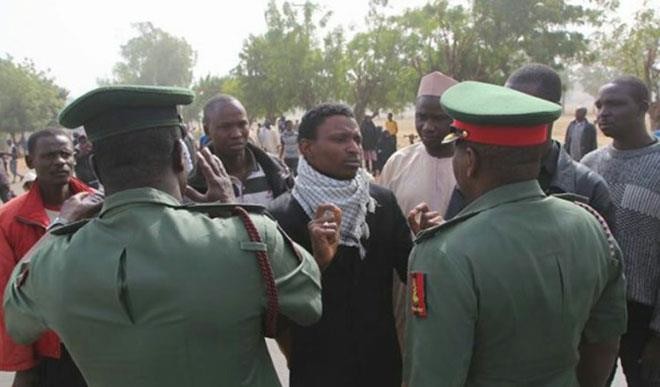Unanswered questions from military/ Shi’ites encounter
If the Shiites so constitute themselves into nuisance to fellow community should there not be due process of dealing with the menace? Is this not the difference between the rule of law and rule of men? Again, going by the video clips and pictures going around in the web, can that justify what later ensued […]


If the Shiites so constitute themselves into nuisance to fellow community should there not be due process of dealing with the menace? Is this not the difference between the rule of law and rule of men?
Again, going by the video clips and pictures going around in the web, can that justify what later ensued (because the Shiites asked for it)? Is the Nigerian military bound only by its rule of engagement? What of international human rights law and humanitarian norms?
What sort of precedents are we laying in terms of respect for human dignity and human rights, even to the local community? Violence begets violence? Did the Shi’ites blocked the way in an effort to assassinate the Chief of Army Staff (giving the fact that he was expected that day)? Or were they protesting what they consider perpetual ill treatment by the military or paramilitary?
Can the military claim the whole operation was done according to the due process of law? If it was a spontaneous reaction to assassination attempt why the second visit and extension of attack to Tudun Wada residence and even Damboa? Were the collateral damages justified? What of non-Shi’ites? Lastly and more importantly, as a nation with no sense of national memory, what lessons do we learn from the whole of this saga in addition to the Boko-Haram scenario in the recent past. We can’t continue stumbling and fumbling as a nation.
Since the era of state formation in Europe and especially after the battle of Solferino through the First and Second World War, there were terrible excesses inherent in inter-state or international wars. In order to curb these excesses a system of law developed through the relevant arena (i.e international treaties) to deal with relevant forces.
Hence, the series of treaties, starting from 1864 up to 1949 sets of Geneva conventions and their additional protocols, of about 600 articles, contained between the Geneva convention and the two additional protocols, only 29 articles specifically deals with non-international armed conflicts. But from the second half of the last century when wars of independence and internecine wars became rampant, the law started twisting its form to deal with the new trend of wars (i.e internal armed conflict often described as non-international).
The second additional protocol with about 28 articles came about to compliment the article 3 common to Geneva conventions. The ICTY and ICTR jurisprudence by proactive jurists developed customary law to deal with in human excesses airing its head in the new trends of violence. The theatres of war are changing especially in Africa. Beyond the orthodox definition of “conflicts” supposed to be regulated by humanitarian norms, a new ground is forming – the launching pad of conflicts often referred to as OSV (other situations of violence).
This includes sporadic riots and attacks. The conservative approach of orthodox scholars is that the military, in these situations, is not restricted by humanitarian norms. This notion left a wide gap that Prof. Oluwo, in the African year book of IHL, referred to as “a dangerous lacuna”.
Humanitarian norms are no longer limited to treaties or conventions. Humanitarian norms and human dignity are principles which any country owes to its citizens whether recognized by technical arguments of international laws or national laws. At least the minimum humanitarian standards, upheld by the Turku declaration, must be made a basic tenet of the Nigeria military when dealing with even the criminals or rebels of the land (assuming they truly are). We owe it to them to be so fair and humane because they are still human.
Barr. A.J Suleiman [email protected]
